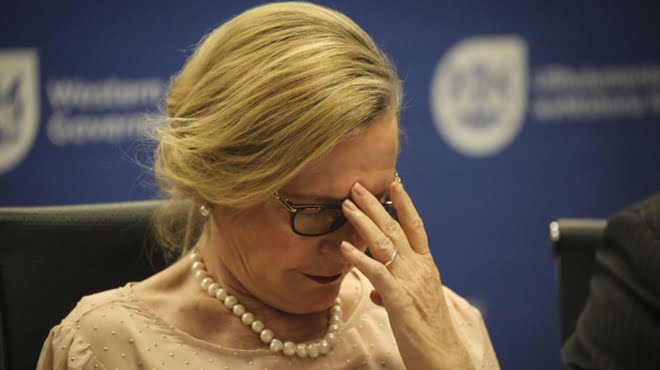Western Cape premier Helen Zille has sparked controversy by volunteering to lead a tax revolt in South Africa if the government fails to take action against those implicated in corruption – or if they are again elected into government.
A tax revolt is a political struggle to repeal, limit, or roll back a government-imposed tax.
Zille, via social media platform Twitter at the weekend, highlighted that there are multiple cases of successful and impactful tax revolts around the world, adding that she will focus on several of these cases in the coming weeks
“In the 21st Century, there have been over 80 case studies of impactful tax revolts. More than double that in the 20th century. But given that we are only in first fifth of this century, the trend is clearly escalating because it introduces accountability in government,” she said.
The premier’s comments thrust the topic of tax revolts into the spotlight, drawing many responses from across the political spectrum. Frustrated South Africans threw support behind the move – while others labelled it as irresponsible and illegal.
Among those weighing in are leading South African economists and legal minds – some of whom have pointed out that a tax revolt is either coming, or already in full effect.
Tax revolt is coming
Chief economist at Economists.co.za, Mike Schussler said that tax revolt at a municipal level would be inevitable if government does not address the issue of non-payment for services.
The problem was highlighted in recent data published as part of the Eskom Nersa hearings, pointing out that municipal debt has risen to a combined R34 billion in 2017/18, with Soweto alone accounting for half of that (R17 billion).
As municipalities come under increasing pressure due to non-payment, the government is instead choosing to hike prices instead of tackling the culture of non-payment, Schussler said.
He added that municipalities budgeted for a R21 billion in debt impairment in the 2018/19 financial year.
Thus, honest citizens who pay their bills are being increasingly burdened by those who do not, which will ultimately push them to stop paying as costs become less affordable.
“The honest need protection from the dishonest non-payers, but there is failure of leadership to address this,” Schussler said.
“This creates the ideal environment for more payment revolts. The honest are left to fend for themselves as services are interrupted. Clearly, defaulters are a problem that the honest are paying for.”
Tax revolt is already happening
Others are of the view that a tax revolt is already happening in the country – including human rights lawyer, Richard Spoor, who noted that consumers push back against taxes and evade burdensome fees in many places.
This includes not paying e-tolls, or refusing to pay for TV-licences – or even buying illicit cigarettes.
“The real question to be asked is why has tax evasion become endemic and an ever bigger issue? The answer has to do with a perception that government is overreaching and doesn’t give value for what it takes from us as in taxes,” Spoor said.
Another form of ‘tax revolt’ is the flight of skills through emigration, or the wealthy individuals who remain in the country who invest their money elsewhere.
The latest data published by SARS show that only 4.9 million people pay 97% of total income tax in the country. It’s this tax base that is coming under increasing pressure.
According to economist Magnus Heystek, there are only about 100,000 “really rich” people in the country (people with a net worth higher than $1 million), and they are already pushing back against the system in their own way.
“They are sending money offshore in droves, and have stopped buying property in South Africa. Many are setting up base in Mauritius where entrepreneurs are encouraged and taxes are low,” he said.
Tax revolts are illegal
Zille’s party, the Democratic Alliance, has distanced itself from her comments, with party spokesperson Phumzile van Damme saying that a tax revolt would be illegal and against the rule of law.
“We cannot have a state of anarchy just because we are unhappy people chose to vote the ANC into power again,” she said.
“If it’s a choice the people of SA make…it is what they want and the outcome of a democratic process we must respect and uphold the rule of law.”
Civil action group, Outa, which has led the campaign against e-tolling in the country, also tried to categorise its ‘civil disobedience’ campaign, encouraging people to not pay e-tolls, as something other than a tax revolt.
The group said that the fight against e-tolling is different because the legality of e-tolls is still being disputed.
“Outa’s stance on a tax revolt is clear: we won’t lead or support it. It will create chaos in South Africa. Citizens will suffer, not government,” it said.
Full tax revolt is unlikely
Speaking to EWN, public finance economist Tania Ajam said that a tax revolt would be difficult to pull off because of the way tax is collected and handled in South Africa.
Tax manager at Mazars, Tertius Troost, previously noted that SARS has many methods to collect tax revenue – and the refusal by taxpayers to pay tax will not necessarily have the desired result.
“The Tax Administration Act can levy penalties on non-compliant taxpayers and if the taxes remain outstanding, SARS may apply for a court order to have the outstanding taxes collected on its behalf by a third party (e.g. the taxpayer’s bank),” he said.
He added that a large amount of tax revenue is also collected from so-called indirect taxes (i.e. VAT, fuel levy, etc.), which are effectively inescapable.
Ajam suggested that frustrated South Africans should make use of the democratic institutions already in place (like the office of the public protector) and strengthen the justice system.
High Court Judge Dennis Davis also said it would be better to put pressure on all state institutions to hold people to account, instead of pushing for a tax revolt which would ultimately do harm to the poor.















